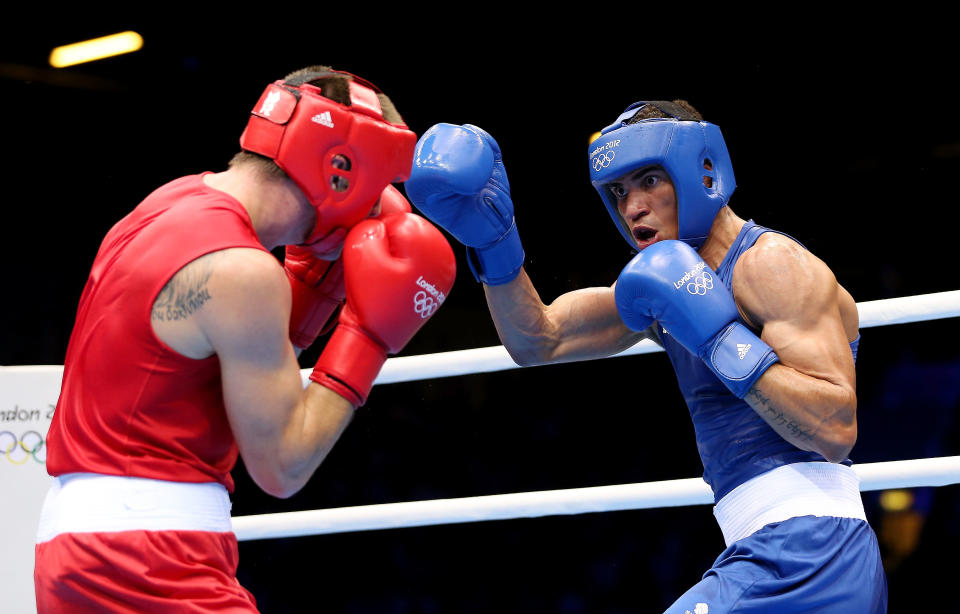Ogogo calls on young athletes to listen to coaches as lockdown eases

Anthony Ogogo believes aspiring young athletes should listen carefully to their coaches when trying to strike the perfect balance in training after lockdown.
Ogogo scooped bronze in the middleweight boxing category at the London 2012 Olympic Games, having grown up in the Suffolk town of Lowestoft, having previously won silver at the 2010 Commonwealth Games in Delhi.
The 31-year-old was a SportsAid-supported athlete as he was making his way in the sport, and attended the charity’s dinner back in 2007, when he rubbed shoulders with athletics great Linford Christie and tennis star Andrew Castle.
And having also gone on to enjoy a successful, albeit short-lived, professional career after scaling those dizzy Olympic heights, Ogogo has told young athletes of the importance of surrounding yourself with the right people as the current lockdown is eased.
“It’s really hard to find the balance between going flat out and managing your workload,” he said.
Getting it in early doors on a Saturday morning before heading up to see mates, enjoy a shandy (social distance obviously), and reminisce about a great man *Man Like Chappo*, who left us last week. Miss and love you my brother 🙌🏽❤️🙌🏽. pic.twitter.com/B9qj1kpAMX
— Anthony Ogogo (@AnthonyOgogo) June 6, 2020
“It’s a big issue and it’s important to have a coach that you trust and who knows you as an athlete.
“Some people can train more than other people because of the way they’re built and their physical make-up - not everyone’s the same.
“Often when I was boxing, a coach would describe the same coaching session for everybody, but that’s not necessarily the best thing, as it’s not a one size fits all approach.
“It’s down to the individual athlete, and when you’re a young athlete and you want to be successful it’s difficult, and that’s why you need a good coach that knows you.
“You need a coach and who can instruct you about when to pull the trigger and train really hard, and when to take your foot off the gas and do different things.”
Ogogo was forced to retire from boxing last year after suffering a barrage of injuries and being registered blind following a fractured eye socket, ending his career with a record of 11 wins - including seven knockouts - from his 12 professional fights.
But it was his exploits at London 2012 for which he became most renowned, as he toppled world No. 1 Evhen Khytrov on his way to a semi-final bout against Brazil’s Esquiva Falcão Florentino, where he lost 16-9 on points.
It’s been lockdown not knockdowns for Ogogo currently, however, and the former king of the ring has warned young SportsAid athletes of the dangers of training too hard during the present situation.

“How much you ramp your preparations up completely depends on the sport and the athlete,” he added.
“For me, I was always very determined and trained really hard, so needed coaches to help me rein it in as I wanted to train really hard.
“When you’re young, fit and healthy you can train really hard, but sometimes less is more and you need to be careful.
“Upping the training right now may not actually be a good thing because by the time the qualifiers or the next event comes around, you could be broken and you may have damaged yourself.
“There’s always something you can do, even if it’s not physical - to make yourself more mentally tough and robust, you can study, watch tapes, and I used to spend hours watching videos of people I might box in the future.
“Some of them I may never actually box as you always fight who’s in front of you, but until the draw’s been done you never know who you might fight.
“It’s better to have a big array of knowledge and then use a little bit of it, than not have the knowledge and then they beat you because they’ve done their research and their homework and you haven’t.”
Always a pleasure when one of the top boxing writers in the world, Colin Hart, writes a piece on you, thanks Col. Articulating some of my struggles during my boxing career & the pride I have for my new career as a pro wrestler for @AEWrestling
Here it is:https://t.co/RsupaTnRE1— Anthony Ogogo (@AnthonyOgogo) June 5, 2020
Ogogo knows all about what it takes to be a winner, having beaten the likes of Gary Cooper, Frane Radnic and Bronislav Kubin on his way to global professional stardom.
And as the next generation of talent seek to follow in his footsteps, he says it’s those who have the motivation to continue training, no matter what, who are destined for greatness.
“I’m very driven and committed, but it’s far easier to train for something when there’s a goal in sight, so when that goal does get moved then it does get much tougher,” he said.
“But that’s what separates the good and the great, and to get to a final and win a medal, you need to keep putting the work in, even if you don’t know when you’re going to be back out performing.
“I think that’s what makes a winner - it comes down to who wants it the most, and the guys who are training now when everyone else is losing motivation, are the ones who will have the medals round their neck when competition resumes.”
Please visit www.sportsaid.org.uk for more exclusive content from currently supported SportsAid athletes, their parents and guardians, and the charity’s extensive alumni!


